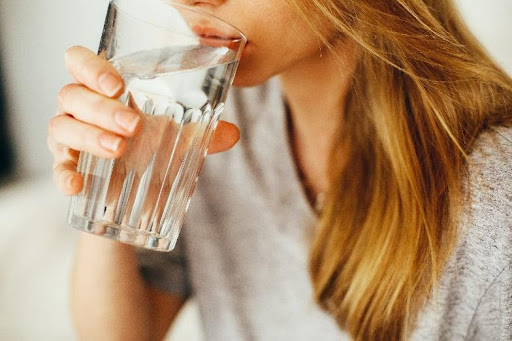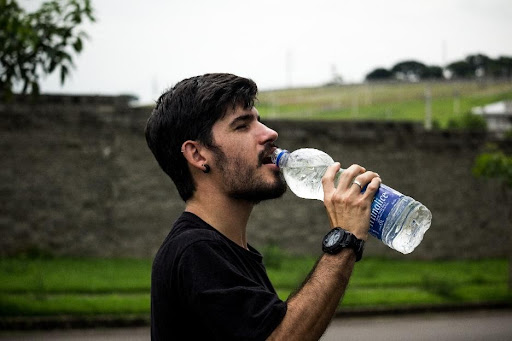Hydration
Our bodies are made up of about 70% water and we need this to function properly and survive.
Fluid Intake
If we lose some of this we need to replace it or there can be severe consequences.
Water Loss (as % of Body Weight)
- 1-2% Thirsty / Impaired Athletic Performance
- 3-5% Impatience / Nausea / Heat Exhaustion
- 5-10% Incapacitation / Hallucinations
- 10% + Circulatory Collapse / Heat Stroke / Delirium
Generally we are unlikely to lose more than 2-3% of our body weight without doing something about it, but during training / competition it is easy to forget and this can be a very big mistake.

Photo Woman drinking water
A normal person is generally advised to drink about 2 litres of water a day (can be contained in other drinks).
An athlete is going to lose a lot of fluid through sweat - which is the body's way of bringing our body temperature back down when we have heated it up with all the exercise we are doing. The amount lost depends on a number of factors - the individual, the temperature, levels of exercise - but suffice to say that on a warm day a runner can lose up to 3% of their body weight in an hour.
It is therefore very important to drink enough fluid - you'll need experiment with this a little (you should weigh no less than 2% lighter after exercise than before it. A reasonable starting place would be to have a litre / hour during exercise.
In addition it is worth keeping a drink on the go throughout the day as in total you'll need 2-3 litres of water, drunk throughout the day, to perform at your best.

Photo Man drinking water
Remember however, that it is possible to have too much water, which leads to a condition called hyponatremia, which is where the salt balance of your system is badly disturbed. You would have to drink a LOT of water to get this, but it is far from an unheard of condition. In the past it has led to cramps (when we often think drinking water is reduce the risk of this) and has even led to deaths in the past, even in the London Marathon in 2007 (a particularly hot day)
Sports Drinks
We talk much more about this in the Sports Drinks section, but these can be an important way of getting fluids into our body. In particularly an isotonic drink is more readily absorbed in the stomach than just water - so this is worth considering. There are 3 types of drinks; hypotonic, isotonic and hypertonic - again these are explained in more detail in the sports drink section of the site.
It is good for runners to eat little and often throughout the day (making sure you don't just add vast numbers of calories, but reduce the size of the large meals (principally the evening one).
